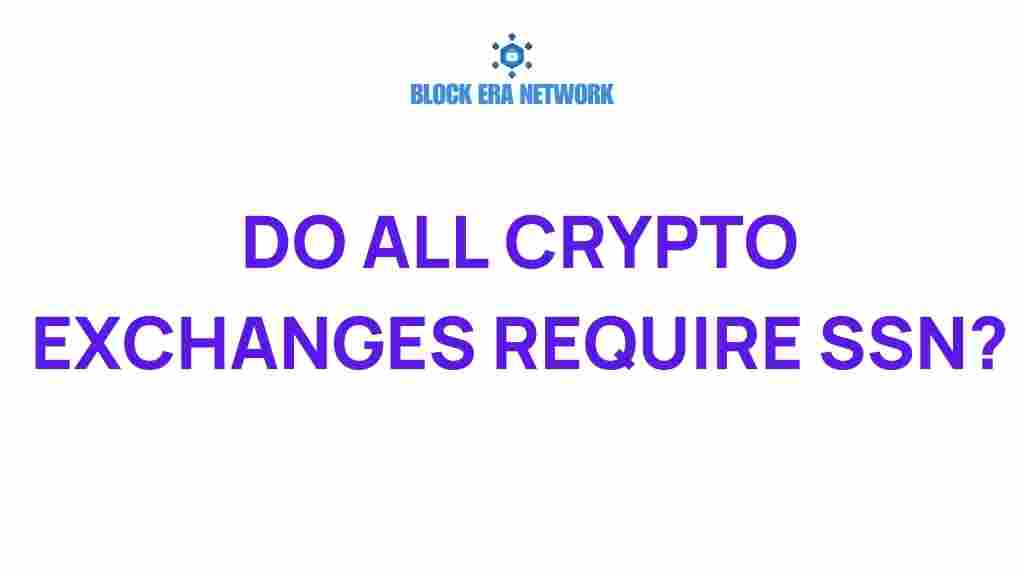Do All Crypto Exchanges Require SSNs? Unpacking the Myths
The rise of cryptocurrency has transformed the landscape of digital finance, creating new opportunities and challenges for investors and traders alike. As the popularity of crypto exchanges grows, so does the discussion surrounding user privacy and security, particularly concerning the requirements for identity verification. One common question that arises is whether all crypto exchanges require Social Security Numbers (SSNs) for registration and trading. In this article, we will unpack the myths surrounding crypto exchanges, delve into SSN requirements, and explore the implications of identity verification in the context of regulatory compliance, cryptocurrency security, and user privacy.
Understanding the Basics of Crypto Exchanges
Before we dive deeper into SSN requirements, it’s essential to understand what crypto exchanges are and their role in the cryptocurrency ecosystem. Crypto exchanges are platforms that facilitate the buying, selling, and trading of cryptocurrencies. They can be categorized into two main types:
- Centralized Exchanges (CEX): These are managed by a company and act as intermediaries between buyers and sellers. Examples include Binance and Coinbase.
- Decentralized Exchanges (DEX): These operate without a central authority, allowing users to trade directly with one another. Examples include Uniswap and SushiSwap.
Each type of exchange has its own set of rules and regulations, particularly regarding KYC regulations (Know Your Customer) and identity verification.
SSN Requirements: What You Need to Know
When it comes to registering on a crypto exchange, many platforms implement KYC regulations to comply with local laws and prevent fraud and money laundering. This often entails collecting personal information, including SSNs in some jurisdictions. But do all crypto exchanges require SSNs? Let’s explore the factors influencing these requirements.
Factors Influencing SSN Requirements
Several factors determine whether a crypto exchange will require your SSN:
- Jurisdiction: Different countries have varying regulations regarding financial transactions and identity verification. For example, exchanges operating in the United States typically require an SSN for users to comply with federal regulations.
- Exchange Type: Centralized exchanges are more likely to require SSNs as they must adhere to strict compliance measures. In contrast, decentralized exchanges may not require SSNs since they facilitate peer-to-peer transactions.
- Trading Volume and Limits: Some exchanges may only request SSNs for higher trading volumes or specific features, allowing users to trade smaller amounts without extensive verification.
The Role of KYC Regulations
KYC regulations are crucial in the cryptocurrency space. They help exchanges verify the identity of their users to prevent illegal activities such as money laundering and fraud. Here’s how KYC works:
- Identity Verification: Users must provide personal information, including their name, address, date of birth, and often their SSN.
- Document Submission: Users may need to upload identification documents, such as a driver’s license or passport.
- Ongoing Monitoring: Exchanges regularly monitor transactions for suspicious activities, requiring further identification if necessary.
While these measures enhance cryptocurrency security, they also raise questions about user privacy and the handling of sensitive data.
Privacy Concerns and User Data
One of the most significant concerns for users is how exchanges handle personal information, especially SSNs. Here are some key points to consider:
- Data Protection: Reputable exchanges implement robust security measures to protect user data, including encryption and secure storage.
- Data Sharing: Users should be aware of whether their data is shared with third parties or government entities.
- Option for Anonymity: Some decentralized exchanges allow users to trade without revealing their identities, appealing to those who prioritize privacy.
Step-by-Step Process: Registering on a Crypto Exchange
If you’re considering registering on a crypto exchange, here’s a general step-by-step process you can expect:
- Choose Your Exchange: Research and select a suitable exchange based on your needs and location.
- Create an Account: Sign up by providing your email address and creating a password.
- Complete KYC Verification: Submit personal information, including your name, address, date of birth, and possibly your SSN.
- Upload Identification: Provide necessary documents like your driver’s license or passport for verification.
- Enable Security Features: Activate two-factor authentication (2FA) to enhance your account’s security.
- Deposit Funds: Begin funding your account with cryptocurrency or fiat currency.
- Start Trading: Once your account is verified and funded, you can start trading on the platform.
Troubleshooting Common Issues
While registering on a crypto exchange, users may encounter various issues. Here are some common problems and their solutions:
- Verification Delays: If your account verification takes longer than expected, contact customer support for assistance.
- Document Rejections: Ensure that your identification documents are clear and meet the exchange’s requirements. If rejected, re-upload corrected documents.
- Account Lockouts: If you are locked out of your account, use the recovery options provided by the exchange or reach out to support.
Conclusion: Navigating the SSN Requirements in Crypto Exchanges
In conclusion, while many crypto exchanges do require SSNs as part of their identity verification processes, this is not a universal requirement across all platforms. Understanding the nuances of SSN requirements, regulatory compliance, and KYC regulations is essential for navigating the world of cryptocurrency effectively.
Always choose reputable exchanges that prioritize cryptocurrency security and user privacy. If you prefer anonymity, consider exploring decentralized exchanges that offer more privacy-friendly options. Remember to stay informed about the regulations in your jurisdiction and the practices of the exchanges you use.
For more information on cryptocurrency regulations, visit Investopedia for an in-depth overview.
If you have further questions about crypto exchanges and their requirements, feel free to reach out or explore our other articles for more insights on digital finance.
This article is in the category Crypto Security and created by Block Era Network Team
